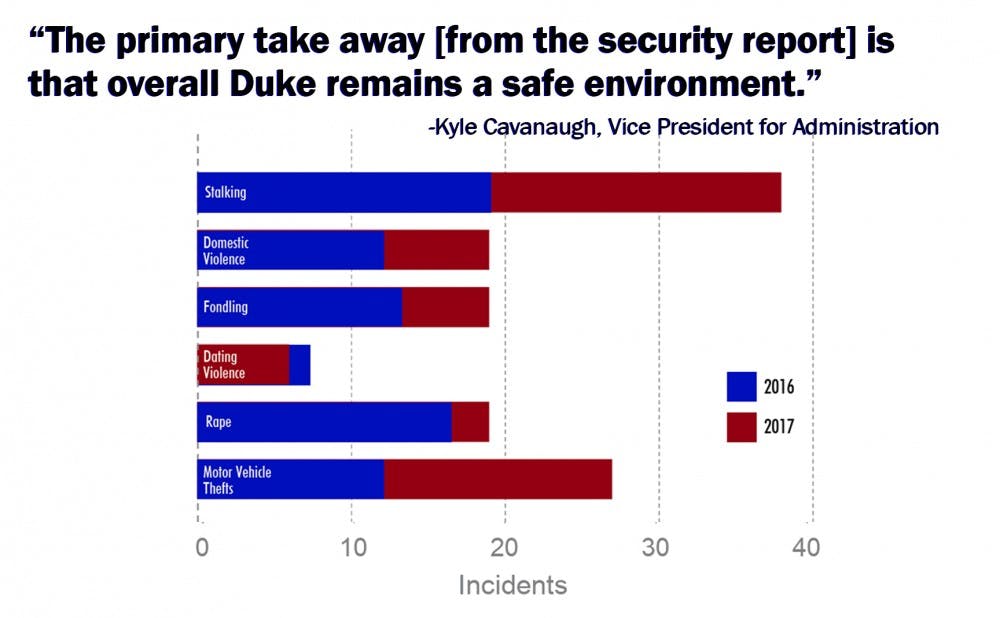Although violence against women has increased on campus in the past year, Duke's administration maintained that the University remains a safe environment.
This year's 2018 Annual Clery Security Report shows that Violence Against Women Act crimes—including incidents of stalking, domestic violence, rape and fondling—all increased from 2016 to 2017. The report includes crime report statistics from 2015 to 2017 compiled from campus police and security, local law enforcement and University officials responsible for student and campus activities.
Incidents of stalking increased dramatically from 16 reported incidents in 2016 to 38 in 2017. Most were considered cyber stalking, John Dailey—chief of Duke University Police Department—told DukeToday.
The majority of incidents took place on campus but were not reported in residential facilities.
“If a person receives two or more unsolicited messages, whether through text, social media or other means, and those messages create substantial emotional distress for the victim, we are required by Clery to count them as cyber stalking,” Dailey said.
Kyle Cavanaugh, vice president for administration, wrote in an email to The Chronicle that almost all of the stalking incidents were reported as cases of concerning behavior, but were filed as cyber stalking under the Clery Act. Cavanaugh wrote that the administration encourages students to report any unwanted communication that causes fear or distress.
Other Violence Against Women Act offenses increased from 2016 to 2017 as well. Reports of domestic violence jumped from 12 reports to 19. Reports of fondling rose also jumped to 19, compared to 13 in 2016, though six of the 19 reports in 2017 came from one high-school student involved in a three-day off-campus event sponsored by Duke, according to DukeToday.
Dating violence reports remained steady, with six reported incidents in 2017 compared to five and seven in 2015 and 2016, respectively.
There were 19 rape cases at Duke last year in the report, up two from the 17 that occurred in 2016. However, only two of the rape cases were reported to Duke Police for investigation. One of the cases resulted from an incident in 1980, according to DukeToday. The Clery Act records incidents by the year in which they are reported, rather than the year in which they occur.
Cavanaugh wrote that one case resulted in criminal charges, whereas the other was handled by the Office of Student Conduct.
The report showed a decrease in liquor and drug law violations on campus as well as robberies and aggravated assault. However, burglary and motor vehicle theft increased in 2017. There were 27 reported motor vehicle thefts in 2017, compared to 12 in 2016. Most of the vehicles stolen were mopeds, Cavanaugh wrote.
However, he remained optimistic about the safety of the University.
"The primary take away [from the security report] is that overall Duke remains a safe environment," he wrote.
Violent crimes on campus are rare, as theft remain the most commonly reported crime at Duke. He also noted that Duke continues to take steps to improve campus safety.
"Recent enhancements to security include the addition of security cameras on campus to better monitor events and activities, and tools such as the LiveSafe mobile app, which allows people to submit security tips to Duke Police," he wrote.
In the report, Cavanaugh asked readers to carefully review both the crime statistics and particularly the crime prevention tips, emphasizing the role of students, employees and visitors in maintaining a safe campus environment.
The Jeanne Clery Disclosure of Campus Security Policy and Campus Crime Statistics Act—known as the Clery Act—requires all colleges and universities that receive federal financial aid to publicly report certain crime statistics. An amendment to the Clery Act required universities to report dating violence, domestic violence, sexual assault and stalking, as defined in the Violence Against Women Act.
The security report encompasses reports from police reports, Student Affairs information, campus security authorities and others. Although the reports may involve students, incidents involving university employees, Duke Health patients and campus visitors are also included.
Along with crime statistics, the report also includes information on crime reporting procedures, emergency notification systems and crime prevention programs. It details student rights and options in the event of an incident report alongside post-incident programs and resources.
In addition to the annual report, the Duke University Police Department maintains weekly crime summaries, which are available publicly on its website.
Get The Chronicle straight to your inbox
Signup for our weekly newsletter. Cancel at any time.
Carter Forinash, Trinity '21, was the news editor for The Chronicle's 116th volume.

